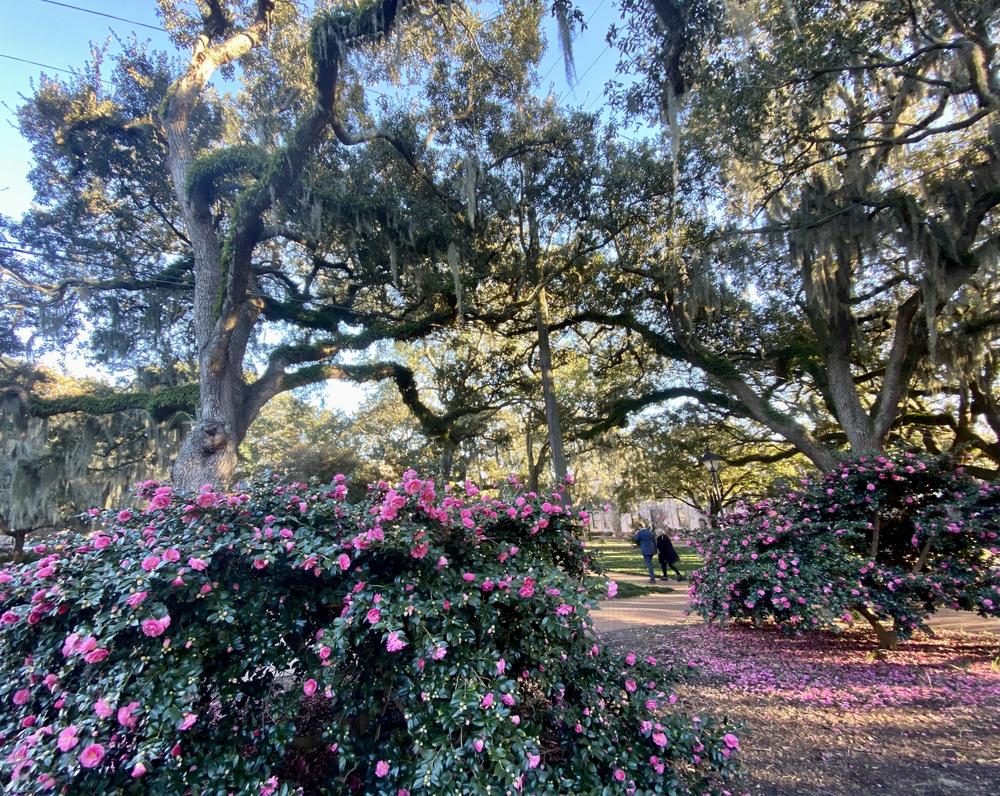
Caption
The park formerly named Calhoun Square, located at Abercorn and East Wayne Streets in downtown Savannah, as seen in November after councilmembers voted to remove Calhoun's name from it.
Credit: Benjamin Payne / GPB News
LISTEN: The Savannah City Council voted to remove the name of John C. Calhoun from a downtown public square, before the city begins the process of deciding on a new name. GPB's Benjamin Payne reports.

The park formerly named Calhoun Square, located at Abercorn and East Wayne Streets in downtown Savannah, as seen in November after councilmembers voted to remove Calhoun's name from it.
Savannah Mayor Van Johnson put it bluntly: “John C. Calhoun does not represent who Savannah is.”
Calhoun — who served as vice president from 1825 to 1832, and who later in the Senate fiercely defended slavery in the years leading up to the Civil War — had since 1851 been the namesake of one of downtown Savannah's 22 iconic public squares.
That 171-year streak ended Thursday, when the Savannah City Council voted unanimously to remove the name from the park — which Johnson referred to immediately after the vote as “the square formerly known as Calhoun Square.”
The resolution adopted by councilmembers — which states that Calhoun “was known to have supported the institution of slavery” and who “had no known ties to the city of Savannah” — only removes Calhoun's name; it does not assign a new name to the square, as a city ordinance dictates that further steps must be taken to rename a public park, including signatures from at least 51% of the adjacent property owners.
The now-unnamed park may not draw as much public attention as some of savannah's other downtown squares — such as Chippewa Square of Forrest Gump fame — but ever since the Calhoun name was called into question, public input has been aplenty: during the previous council meeting, nine people spoke in favor of a name change and three spoke in opposition.
Before councilmembers on Thursday adopted the resolution, the city's municipal archives director, Luciana Spracher, was invited by Johnson to address the Council to provide a historical overview of the land that became Calhoun Square.
Spracher said that in 1850, upon news of Calhoun's death, councilmembers adopted a resolution which stated that the City Council “mourned over him as over one whose lofty genius and impassioned patriotism are unsurpassed in the history of our country, and whose long and illustrious career, from its auspicious beginning to its glorious close, is the property of the whole American people, but the peculiar treasure of the South, in whose service he sacrificed his life.”
Spracher also said that some enslaved African Americans in the 1800s had been buried in the vicinity of nearby Whitefield Square. That square is named after George Whitefield, an Anglican priest who — like Calhoun — was a plantation owner who enslaved African Americans and who pushed for the expansion of slavery.
After Spracher's presentation, Johnson acknowledged that Calhoun had a “resumé that is probably unparalleled in our country” in terms of the many political offices he held, including the vice presidency under two different presidents, “but had views and actions and promulgated policies and things that don't reflect — or should not reflect — the city of Savannah and certainly who we are.”
Following the vote, Alderwoman Kesha Gibson-Carter voiced her support for renaming the square after Susie King Taylor, a Black educator who was born into slavery in nearby Liberty County and served as a nurse for the Union during the Civil War.
“I want the record to reflect that there isn't one square in the city of Savannah that's named for a female,” Gibson-Carter said. “And, there isn't one square in the city of Savannah that's named for an African-American.”
Johnson thanked Gibson-Carter for her input, saying that she will have “the opportunity to weigh in as everyone will have” during the renaming process, which he vowed would be “deliberate, thorough, expansive and inclusive.”
“We recognize that there are many voices and we want to be able to hear them all,” Johnson said. “This is an opportunity that was not afforded to this entire community in 1851, as just a few folks made that decision. We will go and we will consider all voices, and then ultimately this council will make that decision.”